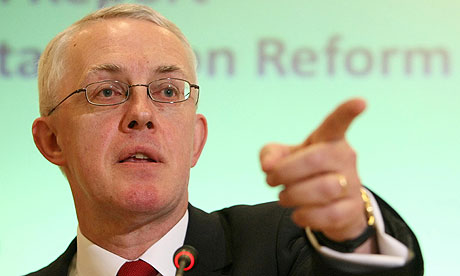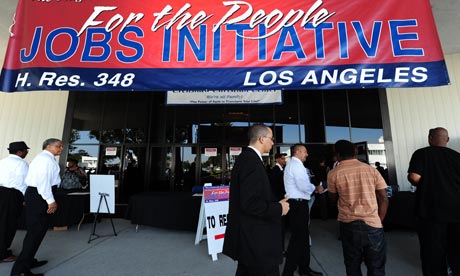
Sir John Vickers, chairman of the Independent Commission on Banking, speaks at a press conference on the commission's interim report earlier this year. Photograph: Dominic Lipinski/PA
Britain's biggest banks are to be given until 2019 – longer than had been expected – to implement radical reform of their operations to prevent another taxpayer bailout of the system.
The Independent Commission on Banking – issuing its report almost three years to the day after the collapse of Lehman Brothers which led to the major 2008 bank bailouts – said that banks should ringfence their high street banking businesses from their "casino" investment banking arms.
The much anticipated final report by Sir John Vickers admitted its proposed reforms would cost between £4bn and £7bn but were more practical and less expensive than the full-scale separation of the kind that business secretary Vince Cable had called for in opposition.
The ICB conceded that its reforms were "deliberately composed of moderate elements" but insisted "the reform package is far-reaching".
It said: "Together with other reforms in train, it would put the UK banking system of 2019 on an altogether different basis from that of 2007. In many respects, however, it would be restorative of what went before in the recent past – better-capitalised, less leveraged banking more focused on the needs of savers and borrowers in the domestic economy. Banks are at the heart of the financial system and hence of the market economy. The opportunity must be seized to establish a much more secure foundation for the UK banking system of the future". George Osborne welcomed the report and said: "The government will now get on with implementing the report." He promised legislation would be passed before the end of this parliament – but would give banks the time frame recommended by Vickers. The chancellor is to address parliament on Monday afternoon.
Up to £2tn of assets could end up inside the 'firewall' – including all domestic high street banking services – as the ICB said that the aggregate balance sheets of the UK's banks was over £6tn and that between one sixth and one third of these should be protected from investment banking operations.
While the ICB made it clear that the current crisis in the eurozone should delay the reforms, it also set a deadline of 2019 for implementation of the changes to coincide with the international capital rule changes being introduced by regulators in Basel, Switzerland.
"Postponement of reform would be a mistake, as would fail to provide certainty about its path. However, it is important that the current economic situation be taken into account in the timetable for implementation of reform. The Commission's view is that setting 2019 as the final deadline for full implementation provides ample time to minimise any transition risks."
The ringfencing is expected to have the biggest implications for Barclaysand the bailed-out Royal Bank of Scotland.
But the ICB provided some relief for bailed-out Lloyds Banking Group by back-tracking on an idea that it be forced to sell off an extra tranche of branches in addition to the 632 currently up for sale to meet EU demands on state aid. However, it said that the high street banking businesses – dominated by Lloyds since the rescue of HBOS in September 2008 – should be referred for a full competition investigation in 2015. Lloyds, which had lobbied hard against the proposal, said on Monday it is "currently assessing the full implications".
The British Bankers' Association said: "UK banks are well on the way to implementing the sweeping reforms already brought in and expected to be brought in by UK, EU and global authorities to make banks and the system safer and to ensure that banks can fail in the future with savers and taxpayers protected and the supply of finance to the economy maintained. The ICB's recommendations cover the same important issues. Any further reform measures adopted by the UK authorities need to be carefully analysed and compared with those agreed internationally. It is vital that the full impact any further reforms will have on the economy, the recovery and banks' ability to support their customers in the UK is understood."


